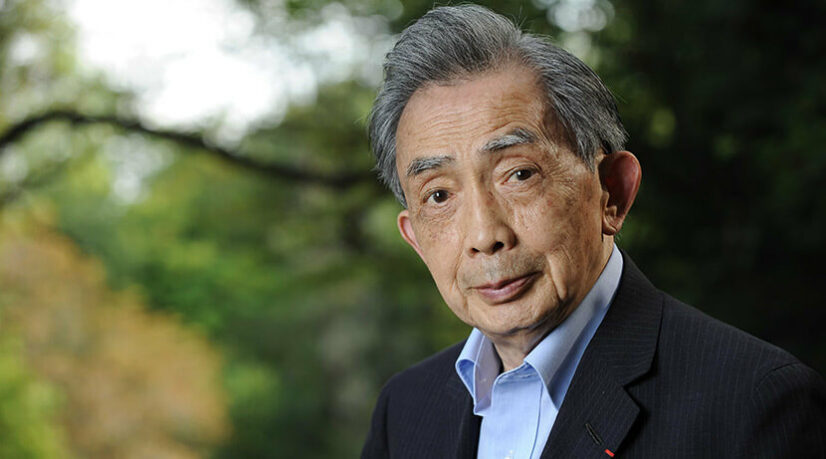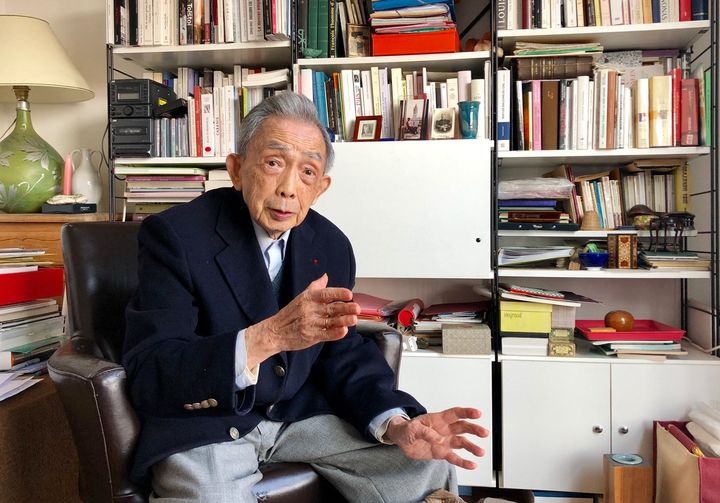22/7/2025

Do you know François Cheng? A member of the Académie française, writer, poet, poet, calligrapher and translator, he is a singular figure in the French cultural landscape. Born in China, arrived in France at the age of 19, he learned French with so much passion and rigor that he made it his language of writing.
Studying François Cheng is much more than discovering an author: it is entering a universe where Eastern thought and Western culture, poetry and philosophy, the visible and the invisible intersect. Through her novels, essays, and poems, Cheng invites us to reflect on the meaning of life, beauty, the human soul, and the role of language.
In a world marked by tensions and cultural misunderstandings, François Cheng appears as a boatman, an architect of dialogue between civilizations. This article invites you to discover his exceptional career, his inspiring work, and the great values he defends. An essential encounter for those interested in language, literature, and the richness of exchange between cultures.
François Cheng was born in 1929 in Nanchang, in south-east China, in an intellectual family. His father, a literate and Christian, was a professor of linguistics. Very early on, young François was immersed in a universe where traditional Chinese thought coexisted with an openness to the West. As a child, he was marked by the turmoil of Chinese history: the Sino-Japanese War, the Civil War, and then the coming to power of the communist regime.
In 1948, at the age of 19, François Cheng left China for France. He arrived in Paris on a scholarship, without mastering the French language well. It is a real uprooting: he finds himself alone, far from his family, in an unknown country, and without resources. But he has an unusual inner strength with him: a thirst for learning, a deep love of culture, and a keen sense of beauty.
During the first years, he lived in precariousness. He is learning French intensively, spending hours reading, copying, and repeating words. He discovered French poetry, which became a guide and a refuge for him: Baudelaire, Rimbaud, Mallarme, but also Claudel, to whom he felt particularly close. This period was fundamental: it forged its intimate relationship with the French language.
In 1973, after more than two decades of living in France, François Cheng officially became a French citizen. It is not only an administrative status: it is a symbolic act. He chose France as a land for writing, thinking, and creating. But he is not denying his Chinese roots. On the contrary, he will focus all his life on building a bridge between his two cultures of origin.
For François Cheng, learning French has never been a simple communication exercise. As soon as he arrived in France, he understood that this language could become much more: a refuge, a tool for thought, a space for creation. What could have remained a survival apprenticeship becomes, for him, a real spiritual path.
Unlike most French writers, François Cheng did not grow up speaking French. He discovered it as an adult, with a difficulty that few can imagine: he did not always understand what he was reading, but he could feel the music, the beauty and the depth of the words. Instead of getting discouraged, he immersed himself in the language with admirable patience and passion. He copies texts, learns by heart, and immerses himself in structure, rhythm and sounds.
For him, French is not just a tool: it is a A land of poetic welcome. A language that he chooses not only to live, but to think and write. This voluntary choice gives it a particular, almost sacred relationship with language. He does not use it automatically, but attentively, slowly, thoughtful, inspired.
His literary style is therefore unique: on the one hand, he has the rigor and elegance of classical French; on the other hand, he is permeated by an oriental sensibility, made up of suggestions, emptiness, breath, silence. His sentences, which are often short and refined, carry a rare density. Each word seems to be chosen as a calligraphic stroke.
In his essays, François Cheng meditates on language as a place of passage between the visible and the invisible. For example, he writes that “each language is a vision of the world.” For him, speaking is already thinking. To write is to deepen the thought, to touch the soul.
Quote to ponder:
“I have entered the French language as one enters religion.”
François Cheng is an inspiring example for anyone learning a foreign language:
François Cheng's work is vast and deeply marked by his dual culture. It covers several genres: poetry, novels, philosophical essays, spiritual works and translations. All of his writings have one thing in common: they seek to reconciling man with himself, with others, and with the mystery of existence.
François Cheng has published several novels, the best known of which are The Told of Tianyi (1998) and Eternity is not too much (2002).
These novels are not only narrative: they are carriers of universal values, expressed with delicacy and poetry.
François Cheng is also a thinker. He has published essays that address fundamental themes: beauty, life, death, soul, love.
Some of the best known are:
In Five meditations on beauty, he defends the idea that beauty — far from being a luxury — is a spiritual necessity. It allows man to connect with the world, with others and with himself.
In Of the soul, it offers an accessible reflection on this word that is often forgotten in our materialist society. For him, Talking about the soul is not a weakness, but a strength.
Poetry is perhaps the most natural form for François Cheng. He writes in French, but also sometimes in Chinese, or in between. His poetry is inspired by nature, emptiness, light, and deep emotions.
It reflects the classical Chinese poetic tradition, but is also aimed at Western sensibility.
“You are the tree, I am the sap, You are the wave, I am the bed, You are the song, I am the listener.”
These short, simple lines say the essentials with few words. It is an ideal style for literary analysis, meditative reading, or translating practice.
In 2002, François Cheng was elected to the Académie française at the age of 73. This event marked a turning point not only in his personal career, but also in the history of French culture. It is in fact becoming the first member of Chinese origin to join this prestigious institution founded in 1635.
During his speech at the entrance to the Academy, François Cheng paid tribute to the French language, to its spiritual and literary masters, and to its Chinese origins. He talks about his gratitude to France, while affirming the importance of his oriental roots.
In particular, he states the following:
“I am given the opportunity to bring, with my words from elsewhere, some of what I received in France.”
His speech is a model of humility, beauty and depth. It shows that identity is not a barrier, but a source of wealth, and that dialogue between cultures can produce a singular and universal work.

François Cheng is not only a writer or a poet. Over the years, it has become a A singular voice of dialogue between East and West, between China and France, between Chinese thought and Western spirituality. Through his work and by his person, he embodies a A living bridge between two visions of the world.
In his writings, François Cheng never opposes cultures. On the contrary, he seeks to show How can they complement each other :
François Cheng connects these two visions. He uses the French language To express the Chinese sensibility, and brings a more contemplative, more organic dimension to French thought.
In his interviews, his essays or even his poems, François Cheng practices a word open, composed, profoundly human. It addresses universal themes: beauty, suffering, death, soul, love. But he always does in a spirit of sharing, never a showdown.
Her book Dialogues with Françoise Cheng, co-written with his philosopher daughter, is a good example. We see two generations talking between Oriental wisdom and Western Christian thought, around essential questions of our time.
In the media, François Cheng is often invited to talk about profound topics in troubled times. His slow, soft and luminous speech contrasts with the general hustle and bustle. He recalls that True speech takes its time, that it comes from the heart, and that it can be an act of peace.
He embodies a Modern form of wisdom, which draws on tradition while remaining deeply human and accessible.
François Cheng offers us much more than a literary work: he offers us a Life path. Through his novels, poems, essays, and his way of being, he embodies what it means inhabit several worlds without ever betraying one or the other. His career path teaches us that language can become a land of welcome, that exile can lead to light, and that the encounter of cultures is not a danger, but a promise of mutual enrichment.
✨ “Every true encounter is a birth. Learning a language is being born a second time.” — François Cheng